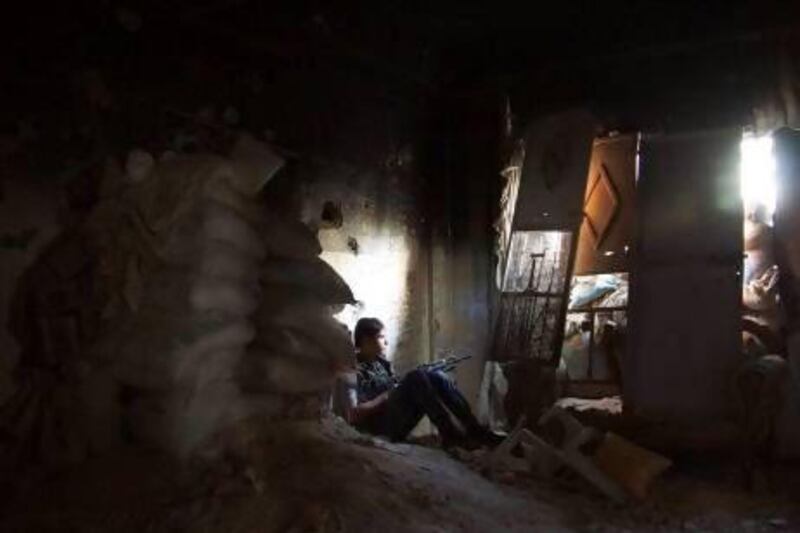ISTANBUL // Abu Havel joined the first Damascus protest in March 2011. Yasin defected from the secret police. Khaled was tortured by Assad regime security forces.
They are youthful, principled and courageous, and all answered the call of revolution when those first protests erupted, determined to play their part in building a new and better Syria.
Two and a half years after that uprising began, the separate lives of these three ordinary, yet remarkable, Syrian men are testament to a peaceful revolt blown badly off course into a war that has cost more than 100,000 lives.
Their hopes and their bravery helped to launch the revolution, but now they must watch impotently as their dreams break apart on the grim realities of national, regional and international politics.
Curiosity and discontent with corruption pushed Abu Havel (not his real name), a welder, to attend the first major organised protest to take place in Damascus in March 2011, a week after the country quietly passed the 48th anniversary of life under repressive emergency laws. He avoided capture and a beating that day at the hands of plain-clothes security forces in the central Marjeh square, where activists gathered to ask peacefully for political detainees to be freed.
Before the end of the year his brief career as a peaceful protester was already over. His cousin had been shot and killed at a demonstration in Ruken El Deen, a Damascus suburb with a large Kurdish population, and Abu Havel was holding a rifle and protecting unarmed civilians from the security forces.
He now fights with the Free Syrian Army, one of the few Kurds left in Arab dominated-rebel ranks and an atheist to boot, with no patience for sectarian or ethnic identity politics. His religious and political beliefs are a secret he closely guards from his colleagues, all of them Sunni Muslims and many of them admirers of Al Qaeda affiliate Jabhat Al Nusra.
Battle-hardened, bearded and looking at least a decade older than his 23 years, Abu Havel predicts a future for Syria of sectarian bloodletting and admits he is disillusioned with the revolution, and unsure about the purpose of fighting on.
"In the last two months I've cried a lot, things are really far away from where they were when it all started," he says. "Now when I look at it, it's all impossible, it's not about winning any more. We want to win and still have a country left, what's winning if we just get rid of Bashar?
"Don't get me wrong, I hate him, and if I saw him now I'd kill him myself but that's not really the goal. It was about life. I want to live, I want to be a human."
While Abu Havel took up arms against Bashar Al Assad, Khaled, 34, a Sunni Muslim from Damascus, has stuck to a path of non-violence.
University educated, and from a respected family, Khaled (also not his real name) continued to deliver humanitarian supplies to besieged rebel neighbourhoods even after multiple detentions and torture at the hands of regime security agents.
But after two years of heart-stopping journeys through checkpoints and furtive meetings with other activists whose names he will never know - again, the security of anonymity - that risky work has largely been halted by the rebels themselves.
Newly established Islamic Justice Committees in many opposition-held zones around the capital have started to insist on a complete monopoly over all aid and have frozen out supplies from small, independent activists groups.
"It was a peaceful revolution and it was going in the right direction, until every other country started to interfere with it, especially the West with its empty promises, then it took a wrong turn, we are just toys now," he said.
Khaled described the revolution-turned-war as a disaster that could have been avoided.
"The world's silence turned it into a disaster, but revolting against injustice and inequality will always be right, no matter what the cost, even if 500,000 people die. We will never get our freedom by silence."
In the mountainous heartlands of Syria's Alawites, the minority sect that has dominated the regime for more than four decades, Yasin, a 31-year-old former member of the feared military branch of the secret police, also decided to join the rebellion when it started.
"The regime was so rotten a revolution had to happen and I knew we all had to join it when it finally started, it was important for Alawites to be there," he said.
Alawite colleagues and friends did not agree, however - they told him never to use the word "revolution" after a meeting at which he insisted protesters were not armed terrorists - and, after helping a group of those protesters evade capture, Yasin defected.
Joining the rebels was not as easy as he had thought it would be, however.
"More and more the Free Syrian Army was being taken over by Islamists, foreign fighters and people who had no interest in democracy and who hated all Alawites. I ended up leaving the opposition when one of these bearded fanatics threatened to cut my throat if I was still there in the morning," he said.
"I want no part of that violence."
Now living in exile in southern Turkey, Yasin laments what he sees as a missed opportunity to have brought down the regime and replaced it with a moderate democratic state.
"That chance has gone and it will never come back," he said. "Syria will be divided into Sunni, Alawite and Kurdish states, all of them radicals, that's the only way to stop the bloodshed.
"I thought Bashar was bad, and I can't believe I'm saying this, but maybe it would have been better if none of this had started."
twitter: For breaking news from the Gulf, the Middle East and around the globe follow The National World. Follow us





